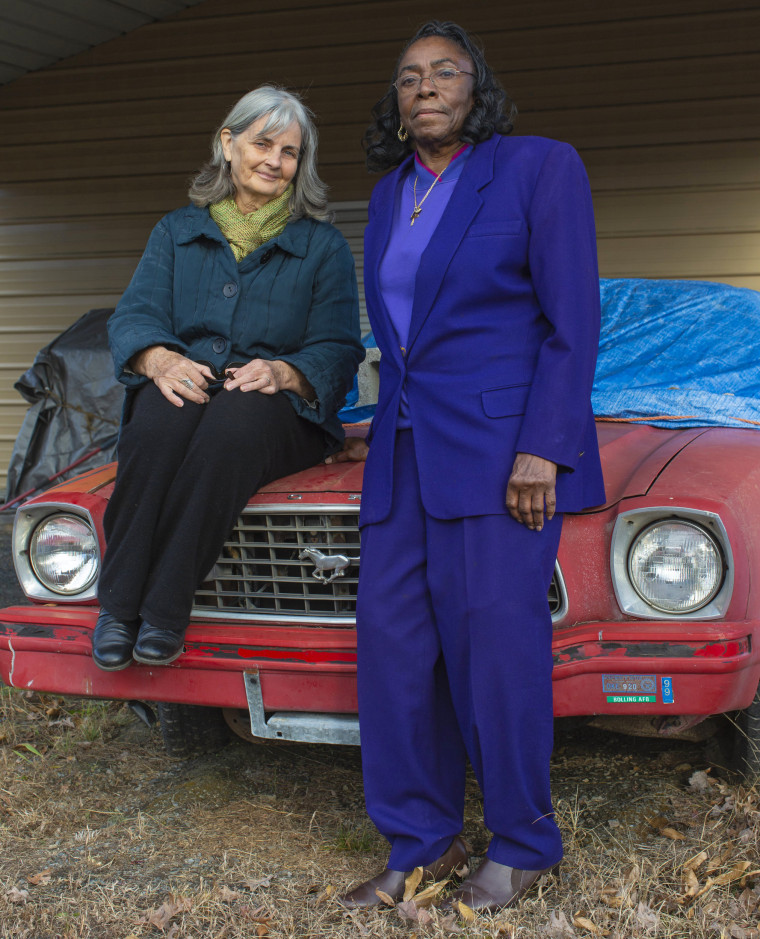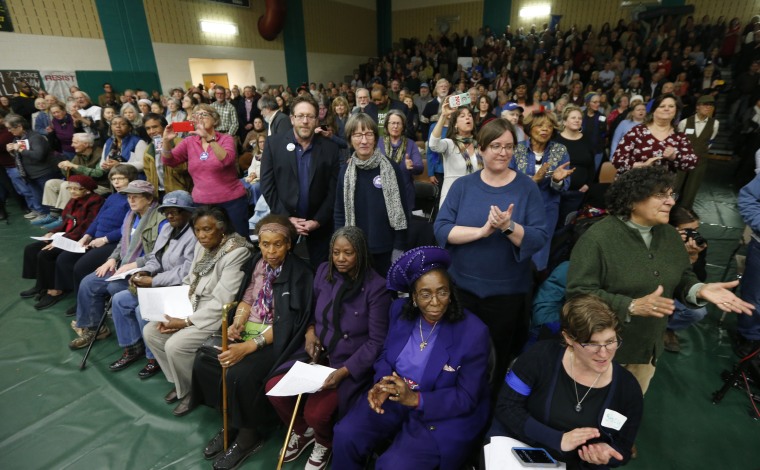By Eric Ortiz | NBCNews.com
“I feel good — I can sleep better at night,” said one resident of a historically Black community in Virginia. “And now I know I’ll be breathing clean air.”

July 6, 2020, 3:49 PM EDT / Updated July 6, 2020, 4:24 PM EDT
By Erik Ortiz
Ella Rose had returned home from church on Sunday, ready to settle in for the afternoon, when her phone rang. It was a friend, Chad Oba, delivering unexpected news: The Atlantic Coast Pipeline, the proposed multibillion-dollar project that had consumed their lives for the past six years, was no more.
It was officially canceled.
“My reaction was ‘hallelujah,'” Rose, 76, recalled Monday. “I was so elated that I started praising God.”
After protracted legal conflicts and a wave of delays, the two energy companies partnering on the project, Dominion Energy in Richmond, Virginia, and Duke Energy in Charlotte, North Carolina, announced they were abandoning the joint venture, a natural gas pipeline that was supposed to zigzag about 600 miles through West Virginia, Virginia and North Carolina.
It was a surprising twist in a fight that had included intense community opposition, a concession from the two companies that they couldn’t overcome the ballooning cost of the project — which had nearly doubled to $8 billion from its original estimate of about $4.5 billion — and uncertainty surrounding the pipeline’s possible completion in early 2022, which would have been an almost three-and-a-half-year delay. The high-stakes plan was formally proposed in 2014, and was expected to benefit from the Trump administration’s efforts to roll back federal oversight and speed up the building of major infrastructure projects.
The pipeline’s demise was followed Monday by a federal judge’s decision to temporarily shut down a pipeline in the Dakotas that was the site of large protests in 2016 and 2017 led by the Standing Rock Sioux Tribe.
While the Atlantic Coast Pipeline had not drawn the same type of attention, there was still open resistance in some communities along its route, including in rural Buckingham County, Virginia, about 70 miles west of Richmond, the state capital.
It was there that a network of environmental activists and longtime African American residents joined forces to stop the building of a natural gas compressor station in Buckingham’s historically Black community of Union Hill. Some families of Union Hill can trace their lineage to slave ancestors and freedmen who settled there after the Civil War.
The Friends of Buckingham, a grassroots environmental group that Oba co-founded, mobilized to bring attention to Union Hill. Last year, former Vice President Al Gore and the Rev. William J. Barber II, who have worked together on their respective campaigns on climate change and the poor, came to the community. Rose welcomed the men inside her home and relayed her fears that a compressor station would compromise her and her neighbors’ health and threaten the air quality and well water.
Rose, a Black retiree whose home on nearly 2 acres would have been among the closest to the proposed compressor station, said she feels “vindicated” after the hours spent attending meetings, speaking at panels across the country and exhibiting a tenacity she didn’t know she had.

“I feel good — I can sleep better at night,” Rose said. “And now I know I’ll be breathing clean air.”
Rose was the first person Oba called once she learned the pipeline had been scrapped. Oba could barely register what had happened.
“I had always told Ella: ‘I will be with you through the end. I will never give up on this, and I will be by your side, wherever it may be,'” Oba said.
Legal battles against the compressor station and the larger Atlantic Coast Pipeline winded through various courts, impeding its progression.
Earlier this year, Oba, Rose and others in Union Hill celebrated a victory when a three-judge panel of the 4th U.S. Circuit Court of Appeals in Richmond unanimously agreed that Virginia’s Air Pollution Control Board had failed to consider how the compressor station project would disproportionately affect residents of the community. The control board had first approved the station’s air permit in January 2019.
“Environmental justice is not merely a box to be checked,” U.S. Circuit Judge Stephanie Thacker wrote in the ruling.

At the time, Dominion, the lead stakeholder, vowed to resolve the appeals court’s concerns and expected construction to resume on the compressor station this summer.
In June, the pipeline project got a key boost after the Supreme Court cleared the way for the pipeline to cross underneath the Appalachian Trail, a move that was opposed by environmental groups that argued that ecosystems and endangered species were at risk because of the project.
In a statement Sunday, Dominion CEO Thomas F. Farrell II and Duke CEO Lynn J. Good said the natural gas project, if completed, would have delivered “the much-needed infrastructure to our customers and communities.”
“This announcement reflects the increasing legal uncertainty that overhangs large-scale energy and industrial infrastructure development in the United States,” they added. “Until these issues are resolved, the ability to satisfy the country’s energy needs will be significantly challenged.”
Energy Secretary Dan Brouillette blamed the “well-funded, obstructionist environmental lobby” for killing the project, saying in a statement that the pipeline was poised to create thousands of jobs and that the “economic promise of this project is no longer a reality for thousands of Americans in this region.”
The pipeline had been touted by local leaders and its supporters in Buckingham, a lower-income county in Virginia, for what it would have brought financially: annual tax revenue of $1 million from the compressor station site and the creation of construction jobs. In addition, Dominion offered to give $5.1 million for a proposed community center and other benefits — on the condition the pipeline was finished first.
Some residents were resigned to the idea that Dominion, a Fortune 500 company, was all but guaranteed to win the permits needed to move ahead with the pipeline and compressor station. That belief created a divide among residents of Union Hill, pitting neighbors against neighbors and family members against one another.
The loss of the pipeline is an “economic blow” to Buckingham County, said Harry Bryant, the chairman of the county’s Board of Supervisors, adding that the loss of any related revenue now means officials will need to assess the possibility of raising property taxes.
He added that despite objections to the pipeline, “the majority of the people in the county wanted it.”
While proponents of natural gas champion it as a better alternative to coal or oil because it produces lower carbon-dioxide emissions, environmental groups caution that it still holds back investment in other renewable energies.
“Virginia and North Carolina have taken important steps towards a clean energy future — now the decks are cleared,” said Greg Buppert, a senior attorney at the Southern Environmental Law Center in Charlottesville, Virginia, which has represented the Friends of Buckingham. “People all along the route can finally rest.”
Those opponents have included small farmers whose lands were subject to eminent domain, Native Americans, about 30,000, who live within a mile of the pipeline’s proposed route in North Carolina, and residents in Northampton County, North Carolina, where another compressor station for the project was being constructed in a census block where 79 percent of the population is Black.
Read the original story in https://www.nbcnews.com/news/us-news/atlantic-coast-pipeline-canceled-after-years-delays-accusations-environmental-injustice-n1232987?fbclid=IwAR2UhAvUUMmLBvdWDyq8ewKq6Ak6HhIHmus0iJDOWtgQMsOlkB7ZX7EX6io
